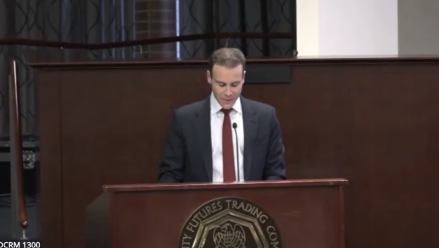A company called RSBIX — linked to the original bid by ErisX to offer sports event contracts in 2020 — has submitted a new application with the Commodity Futures Trading Commission (CFTC) to become a designated contract market (DCM).
The CFTC’s list of DCMs shows a new “pending” application from RSBIX, LLC, submitted Tuesday.
While its documents make no direct mention of sports, its founder and history suggest that the entity most likely plans to list sports event contracts.
The RSBIX application lists prominent gaming lawyer Jeff Ifrah as the “founder and director” of the company. Ifrah has represented betting giants including FanDuel and bet365 as well as founding an online gambling advocacy group, the iDevelopment and Economic Association (iDEA).
Meanwhile, RSBIX was tied to a bid to launch sports event contracts almost five years ago.
ErisX-RSBIX sports event contracts bid
When ErisX — owned by commodities trading giant Cboe — became the first CFTC-registered exchange to try to list sports event contracts, it listed RSBIX as a “partner.”
ErisX originally attempted to self-certify sports event contracts in December 2020. Self-certification is a process where a CFTC-registered exchange says it plans to list a certain type of contract. If the CFTC does not intervene, the contract is treated as if it is allowed.
However, the CFTC instead launched a review of the contracts, citing a “special rule” in the Commodity Exchange Act that says the regulator can take action against contracts involving gaming, war, terrorism, or assassination.
Ultimately, after comments from organizations including the NFL and the American Gaming Association, the CFTC issued a proposed order — which its commissioners would then vote on — that would have banned the contracts. ErisX then decided to withdraw the contracts.
While it was believed that most commissioners at the time would have voted in favor of banning the contracts, one commissioner — Brian Quintenz — publicly revealed that he would have voted against, and published a dissent on the CFTC website.
“I would have dissented from the order prohibiting the ErisX NFL contracts due to significant concerns around the statute’s constitutionality, the regulation’s validity, and the order’s arbitrariness,” he wrote in a preamble to the dissent.
Quintenz later became a board member for Kalshi — which now offers sports event contracts after its own self-certification went unchallenged by the CFTC — and was President Trump’s pick to be the next chair of the CFTC, though his nomination process appears to have stalled amid a dispute with Trump donors the Winklevoss twins.
The original ErisX-RSBIX sports event contracts were intended as a way for sportsbooks and those involved in the sports industry to hedge risk, rather than being marketed toward civilian sports bettors. It is not clear whether this would still be the plan for the new RSBIX now that Kalshi has made CFTC-regulated sports event contracts more mainstream.
Technically, the RSBIX submitting a new application is a different company to the original RSBIX that partnered with ErisX. However, a business formation certificate submitted to the CFTC shows that the original RSBIX is also led and founded by Ifrah. It says the original company, RSBIX Co., permitted the RSBIX, LLC to use a “similar name.”
DCM approval can take years
A DCM is able to list its own contracts and allow users to buy and sell them via its own platform or by partnering with a futures commission merchant, which allows its users access to the contracts.
DCMs are also required to offer “impartial access” to their contracts, which would mean they would have to be offered across the entire U.S., rather than only in specific states.
If recent applications are anything to go by, RSBIX may not be approved as a DCM for years. Railbird and QCEX received DCM approval in June and July, respectively, even though both submitted their applications in late 2022.
If RSBIX faced a similar wait of almost three years, the world of sports event contracts could look entirely different by the time it’s permitted to go live.
The legal status of sports event contracts is still being fought over in the courts, but by 2028 there may be a consensus one way or the other on their legality.
Kalshi sued the states of Nevada, New Jersey, and Maryland after they attempted to enforce cease-and-desist orders blocking sports event contracts. In Nevada and New Jersey, Kalshi won preliminary injunctions allowing it to keep offering the contracts for now. In Maryland, the bid for a preliminary injunction was rejected, but the contracts are still available as the state agreed not to enforce its gambling laws against Kalshi while the prediction market appeals the decision not to award the injunction.
Massachusetts’ Attorney General Andrea Joy Campbell sued Kalshi in state court, arguing the contracts are an illegal form of sports betting, but Kalshi is attempting to have that lawsuit moved to a federal court.
Three California tribes and one tribe in Wisconsin have also sued Kalshi, arguing that the contracts are “illegal sports betting.”
RSBIX to use Polymarket clearinghouse
In a compliance document, RSBIX says it will use QC Clearing as its clearinghouse — an entity in financial exchanges that actually buys and sells every contract in a regulated prediction market, and handles paperwork and moves money associated with those trades.
QC Clearing is part of QCEX, which is currently owned by Polymarket, the largest prediction market by global volume. Polymarket currently does not allow U.S. customers, but bought QCEX so that it could reenter the market, as QCEX was already registered with the CFTC.
Railbird’s documents also say it will use QC Clearing as its clearinghouse.






